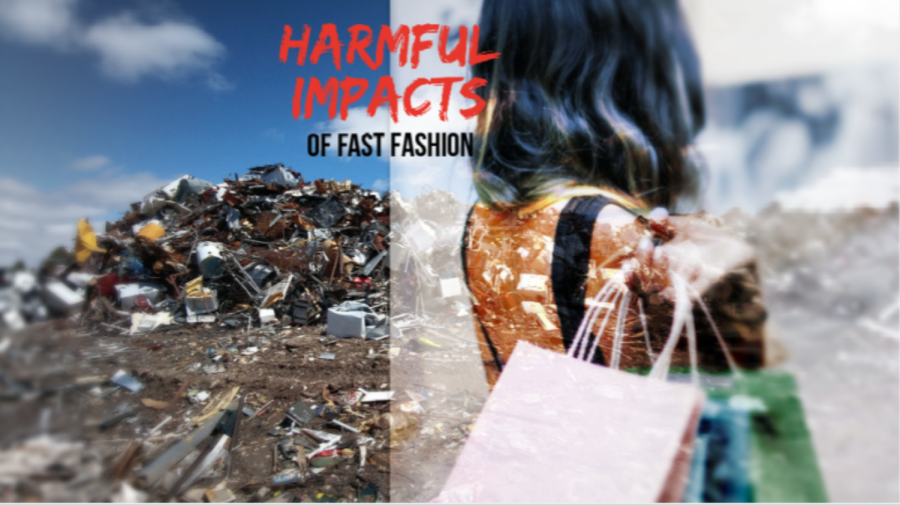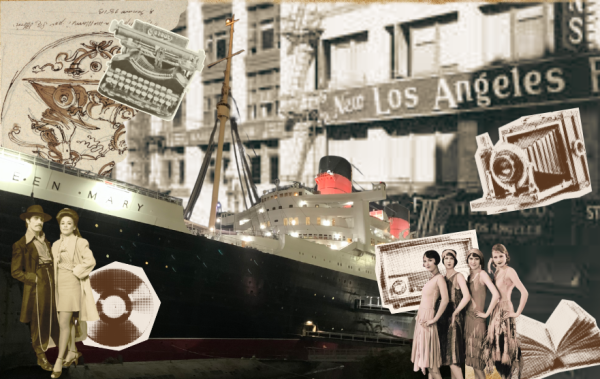The Harmful Impacts of Fast Fashion
Fast fashion is the process in which clothing is made at a rapid rate of production. Because this product is made extremely quickly, companies now have the ability to sell it at a lower price, thus creating a method where consumers buy more quantities of clothing at a cheaper price. When more people buy from these fast fashion companies, it results in numerous detrimental environmental effects around the world. This includes carbon emissions and carbon footprints, an increase of greenhouse gas emissions, depletion of non-renewable resources, and pollution that is negatively affecting the Earth.
On top of these environmental problems, there is a problem with human welfare among some fast fashion brands. In order to produce these fast fashion goods, children are being forced to work, due to unethical child labor policies in countries such as Bangladesh, Argentina, China, India, and many others. These unethical policies take away their childhood and in turn, cause mental and physical harm to childrens’ well-being. The industry is very complex and, with the lack of controls and tabs companies have on how the final product is being made, employers take the opportunity to get clothing manufactured by any means.
Shein, a popular fast-fashion brand, is widely known for lacking transparency in its child labor policies. This is concerning because big fashion brands like Shein should be clear and direct in their policies so the public is aware that they are supporting child labor.
At one point in time, Shein’s Social Responsibility page on their usage of child labor policies stated the following, “We strictly abide by child labor laws in each of the countries that we operate in. Neither we nor any of our partners are allowed to hire underage children. Any partners or vendors found to have violated these laws are terminated immediately and reported to the authorities.”
Even though Shein states that they do not engage in these horrible activities, they do not acknowledge that child labor laws vary from country to country.
According to a report from UNICEF, “Child labor has risen to 160 million worldwide – an increase of 8.4 million children in the last four years” and even more children are at risk due to COVID-19 since there has been a shortage of clothing production.
Along with fast fashion contributing to child labor, fast fashion companies also impact the environment in a negative manner. Fast fashion is responsible for the increase of greenhouse gases; human activities such as deforestation and fossil fuel are adding more carbon dioxide to the atmosphere, causing more heat to be trapped inside and leading to a rise in global temperature.
According to McKinsey & Company, a consulting company of the world’s most influential businesses, 4% of greenhouse gas emissions come directly from the fast fashion industry.
Fast fashion is responsible for the excess use of non-renewable resources: water and land. It is overall the second largest consumer of water. In order to produce a single pair of pants, up to 2,000 gallons of water is necessary. The textile dyes and pesticides used in cotton to make clothing pollute water, which can run off into waterways and add damaging chemicals to the water. This causes harm to farming production and local communities.
Some materials used in order to produce fast fashion clothing are non-degradable; they are made out of synthetic material. This means that unless they are handed down or donated to a thrift store, they can end up in a landfill over a long period of time. As these clothes pile on top of one another, the number of greenhouse gases that are harming the planet increases.
Social media influencers are adding to this problem, making more people support these fast fashion companies. Whether they are unknowingly or knowingly aware of detrimental fast fashion issues, they promote several fast-fashion brands due to sponsorships.
In 2020, popular Tik Tok creator Addison Rae, whose main audience consists of young teens, has been sponsored by Shein since the summer of 2020. On May 29th, 2020, Rae posted Shein’s summer collection with the caption: “Use code “ADDISON” for an extra 15% off the entire @shein_us site! Summer tops by @sheinofficial shop using the link in my bio.”
It is easier for clothing brands to fit into current trends amongst teens so their products will sell at a quick rate during its prime season. By selling cute, fast, cheap, and accessible clothing, fast fashion is perfectly fit for the average trend-buying consumer.
”I shop at fast fashion stores because of the price of the items and the shipping is fast,” says Allie Washington, Huntington Beach High School senior, when asked why she shops at Shein.
Washington is currently unaware of Shein’s child labor scandal, as many consumers of Shein are. She says, “I haven’t heard anything big about the child labor scandal. I have heard a little bit, but not enough to have a strong opinion on the subject.”
This shows how the average consumer is unaware of the issues surrounding the company. One should be educated more on the harmful effects of fast fashion so one can make the conscious decision of whether to support the company or not. If they choose not to, there are several alternatives when it comes to shopping for clothing, such as thrifting and shopping at sustainable clothing stores.
A thrifting retail store, Crossroads, provides many services to their customers. They sell secondhand clothing, including high-end fashion brands, at a reasonable price.
“For 30 years, Crossroads has been spreading the word that secondhand clothing is THE sustainable fashion option. Selling and shopping second-hand gives clothing a second (or third) life and decreases the production demand for new clothing. Our customers are reducing their carbon footprint by keeping clothes out of landfills and purchasing clothes from a store that has sourced its inventory locally from the public. All unsold and damaged clothing is disposed of responsibly, through community donation or textile recycling,” says Sarah Bouza, marketing coordinator of Crossroads trading.
Including Crossroads, there are several other local and national stores that sell sustainable clothing and spread the message of bettering the environment and fair labor practices. Here are just a few:
Your donation will support the student journalists of Huntington Beach High School. Your contribution will allow us to cover our annual website hosting costs.
Thank you for supporting our program!







